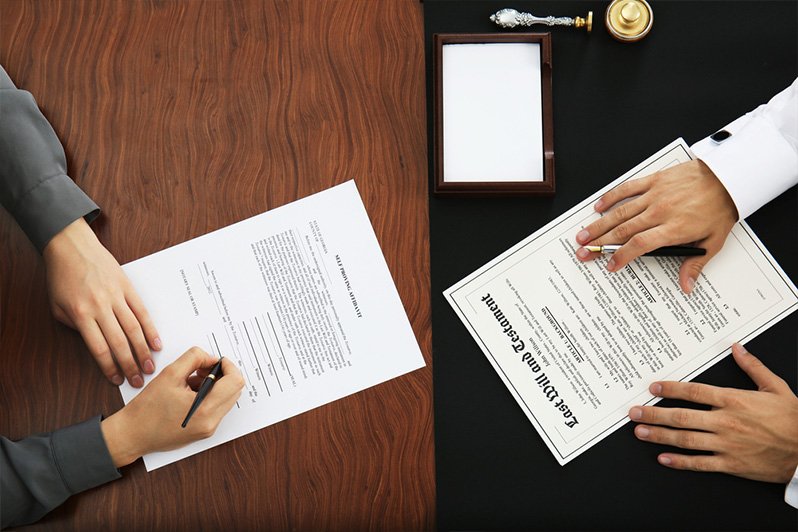What is a Self-Proving Will?
The phrase “self-proving” will suggests that no further evidence of the document’s validity is necessary. While that’s true in a sense, a self-proving will is subject to the same witness requirements as any other written will. New Jersey requires two witnesses to a will, as do New York and many other states.
Posted on November 27, 2017

How is a Self-Proving Will Different?
A self-proving will includes one component that is not strictly required for New Jersey wills: notarized signatures.
Generally, it is not necessary to have the document notarized, since a will is signed by at least two witnesses who attest that either:
- The testator signed the will in their presence, or
- The testator acknowledged to them that the signature on the will was his or hers
However, to make a will self-proving, an attestation must be included, and the testator’s signature and the witnesses’ signatures following that attestation must be notarized.

FREE WEBINAR
5 Things to Know About
Estate Planning
When You Turn Sixty-Five
Why is it Beneficial to Make a Will Self-Proving?
The benefit of a self-proving will is largely a procedural one. When a personal representative submits a will to probate, he or she must prove the validity of the will. One element in proving that the will is authentic and current is to demonstrate to the court that the testator signed the will.
Witness signatures are a part of that process, but present the same problem as the testator’s signature: the court has no way of knowing from the document itself whether the witnesses actually signed the document, or whether they did so at the appropriate time and under the appropriate circumstances. Thus, when the will is not self-proving, the personal representative will typically have to secure the testimony of one of the witnesses to establish the validity of the will.
In some cases, this requires nothing more than a little bit of extra effort. However, a variety of problems are possible: the witnesses may be difficult to locate, may not have clear recollections, or may even be deceased by the time the will is submitted to probate. When these obstacles arise, the personal representative may have difficulty proving the validity of the will, or may be forced to expend both time and estate resource to assemble evidence in support of the will.
A self-proving will eliminates these issues by providing the court with additional evidence that the testator’s and witnesses’ signatures are authentic.
Making a Will Self-Proving in New Jersey
In New Jersey, the notarized signatures can take place when the will is executed, or can be added later. NJ Rev Stat § 3B:3-4 (2013) sets forth language that may be used in in the execution of a self-proving will, and the subsequent section provides a format for making a will self-proving at some point after execution. While the language set forth in the statute isn’t strictly required and the aims can be accomplished by a substantially similar statement, use of the precise statutory language eliminates the risk that some small change might render the language ineffective.
The distinct terminology associated with self-proving wills may create the impression that they are a special type of will. However, self-proving wills are actually the norm today.

FREE WEBINAR
5 Things to Know About
Estate Planning
When You Turn Sixty-Five
Take Advantage of the Benefits of a Self-Proving Will
When you work with an estate planning lawyer to create your will, the attorney will naturally want to ensure that the will can be probated as smoothly as possible, without unnecessary expense or time commitment. Further, making the will self-executing protects against difficulties in proving the authenticity of the will that might arise if the witnesses were unavailable at the time of probate.
If you have already executed a will and it is not self-proving, New Jersey law offers a straightforward process for making a will self-proving after the fact. The small investment required to make that update at this stage could mean significant time savings for your personal representative, and help to ensure that your heirs don’t lose out due to unnecessary estate expenses.
More from our blog…
Elder Financial Abuse: How an Elder Law Attorney Can Help
Elder financial abuse is a significant issue affecting many older adults nationwide. It involves someone exploiting or misusing an older person’s finances or assets for [...]
Does Medicare Cover Prescription Weight Loss Drugs?
Americans have a growing appetite for prescription drugs such as Ozempic, Wegovy, and Mounjaro. Originally developed to treat Type 2 diabetes, they are now exploding [...]
How Social Security Overpayment Rules Are Changing
With a new commissioner at the helm, the Social Security Administration (SSA) has been announcing several policy changes in recent weeks. In late March 2024, the [...]
Claiming the Guardianship of an Elderly Parent
Often an aging parent will lose their ability to think clearly or make informed decisions about their life. This may occur because of dementia, mental [...]
Recent blog posts

FREE WEBINAR
5 Things to Know About
Estate Planning
When You Turn Sixty-Five





